INDIA
Summer thaw
KULDIP, NAYAR
New Delhi Suddenly there is sumer in Indo-British relations. The frozen attitude of Indians, born of the feeling that Britain is always pro-Pakistan, has given place to the realization that it is the UK which ultimately stands against injustice and oppression. The BBC, ousted from India last year following its screening of ' antiIndian ' Louis Malle films, is practically back without demur from any quarter. The call to quit the Commonwealth, heard at the indiscretions of private individuals in Britain, has completely died down. Even London's six months' notice of a 15 per cent tariff on Indian textile imports into Britain has not aroused as much criticism as it would have in the past.
The change in the climate has synchronited with the change in the British government's attitude. When London first equated India and Pakistan on the happenings in East Bengal, Indian opinion was in censed. Later, after Sir Alec DouglasHome had observed that the return of nor malcy to East Pakistan was linked to a satisfactory political solution in that region, hostility in India changed into app reciation and understanding. The support of 220 MPs of the House of Commons for the East Bengalis' democratic aspirations was all the more heart-warming.
And now the open denunciation of the Islamabad government by the British parliamentary delegation, after it visited the sub-continent, has removed the lingering doubts in the minds of many Indians on which side Britain is. They have also noticed with glee that Pakistan has found it necessary to send three notes in protest against Britain's " partisan attitude."
Probably for the first time, no British hand has been seen behind the US arms shipments to Pakistan in the last few days. There was a time when India would generally believe that Washington's thinking on Indo-Pakistan affairs was guided by London; but now there is no such suspicion. Indeed, the roles of Britain and America have changed; the latter is at present the whipping boy for Indians, and they say that despite the pressure of the US, the UK is following 'a friendly policy' towards India. In fact, London has never had it so good so far.
How long this climate will last is anybody's guess. It will depend on how far the UK is willing to back India. After the influx of the refugees exceeding six million, the Indian economy is feeling the strain. The five year plan is to be redrafted and Mrs Gandhi has announced that many development projects must be postponed. Economic tension is rising.
General Yahya Khan's broadcast speech was awaited with considerable hope, particularly when New Delhi was assured by many foreign powers that he would announce substantial concessions to win over East Bengalis and to prepare the ground for a settlement with Sheikh Mujibur Rahman who had swept the polls in East Bengal during Pakistan's National Assembly elections. But General Yahya Khan's speech only indicated that pressure by the world powers, if exerted at all, had failed to make any dent in his thinking. In fact, he declared fresh reprisals against Sheikh Mujibur Rahman's followers — for having participated in the ' struggle ' in East Bengal. New Delhi is now pinning its hopes on the Mukti Faui (East Bengal liberation force) which is making bigger and bigger inroads in East Pakistan and reportedly keeping Pakistan forces on their toes. Allegations are that the Mukti Faui is being armed by India and that many thousands of East Bengalis are being trained by New Delhi to swell the force.
From the Indian point of view, Britain will be on test when these newly trained men go into East Pakistan to 'liberate the country.' If London considers these forays permissible and backs up New Delhi even when these incidents escalate into something bigger, Britain will stay in the good books of Indians. But if it takes only a legalistic view of the situation and equates New Delhi with Islamabad, Indian opinion might revert to the old invective and criticism of 'imperialist Britain.'


































 Previous page
Previous page